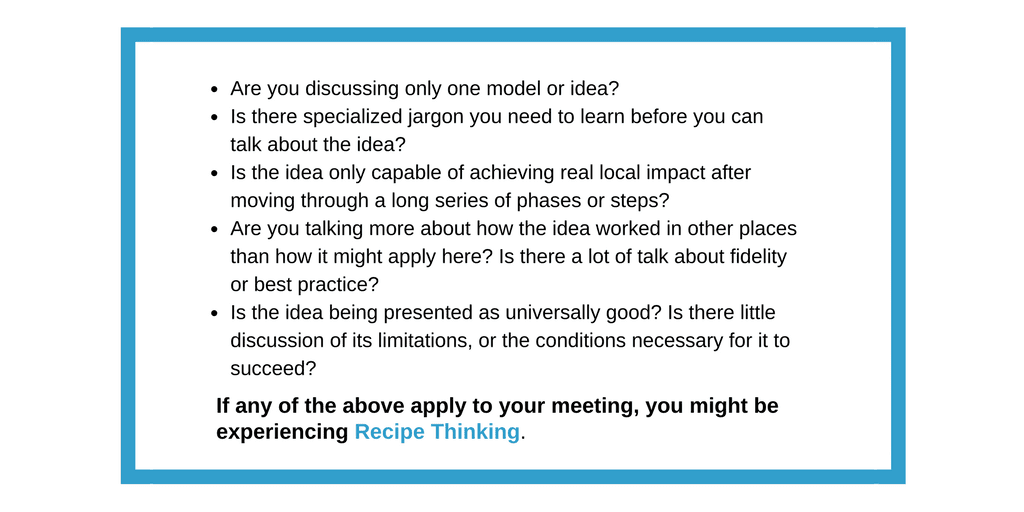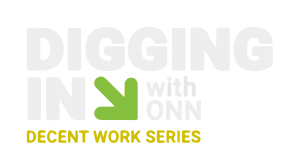
Blog
The perils of recipe thinking in the not-for-profit sector – Archived Content
If you stuck me in a kitchen without a recipe book, I wouldn’t know where to start. When you are inexperienced or lack confidence, a recipe is an amazing thing. It breaks up a complex task into simple steps. It minimizes the risk of making a mistake. It allows you to achieve things you couldn’t otherwise do.
Skilled chefs use recipes, of course, but they interact with them differently than I do. While I follow the recipe to the letter, they are not constrained. They adapt and improvise, based on the ingredients that are in season, the tastes of their guests, and any number of other factors. They may combine elements of two recipes to create a completely new dish. A chef’s goals are different from mine, too. I am using a recipe to avoid embarrassing myself. I’m hoping to pull off a reasonable facsimile of a dish conceived by someone else, somewhere else. After a few runs at a particular recipe, I might eventually serve the dish to close friends.
A chef, though, is going for scale. He or she wants to create something memorable, something that people will pay to eat. He or she hopes to have an impact.
We have recipes in the nonprofit sector too, of course. We often call them models. Just now, for example, the Prince Albert HUB/ COR model is very popular in Ontario. Community hub models and collective impact models are also very useful, and they are attracting a lot of attention. As with food recipes, we interact with our models in different ways, depending on our confidence and our goals. Last fall, I attended a workshop on scaling and impact. When we seek to learn from a successful intervention, the presenters pointed out, we have a number of choices. We may seek to replicate, but we may also adapt or reinvent. We may borrow ideas, principles, tools, technologies, or strategies without adopting the entire “model.”
I think this is an important distinction. Achieving meaningful impact requires a deep understanding of relevant recipes or models, but it also requires sensitivity to context and the confidence to improvise. I think most of us who work in the nonprofit sector have been in meetings where people seem overly focused on following a recipe and unwilling to adapt or reinvent. For me, there are a number of red flags that suggest a group is falling into “recipe thinking.” Some questions to consider are:

Recipes are not bad things, of course. As I said off the top, I’d be lost without them in the kitchen. However, if I’m at a meeting driven by recipe thinking, I often come out feeling like the group hosting the meeting may not be ready to do impactful collaborative work.
In contrast, groups that feel to me like they are serious about community impact tend to be made up of people who have the confidence to adapt and invent. These groups tend to:
– Walk complex ideas back to plain language
– Talk in concrete ways about why they are working together and what they want to achieve here and now
– Consider the pros and cons of multiple options for action
– Take advantage of the “ingredients” that are ready at hand (even if they don’t quite fit the model)
– Move quickly to action. They are willing to improvise, or to do rapid prototyping
– Frequently evaluate their own progress and regroup as needed
– Be willing to say “I don’t know”
In my experience, these groups achieve a lot more.
While I would never advocate throwing out our recipes completely, maybe we need to start taking our “models” a little less literally in the social benefit sector. We might get more good work done if we asked our colleagues in other communities a little less about their models, and more about their helpful examples, their practical tips, their provocative ideas or their inspiring stories.
[line]
Related resources:
– To scale or not to scale
– Designing Impact: How to Support and Evaluate Programs that Aim for Scale
– Broadening the perspective on scale
– “If You Build It..”: A Reflection on A Social Innovation Story


